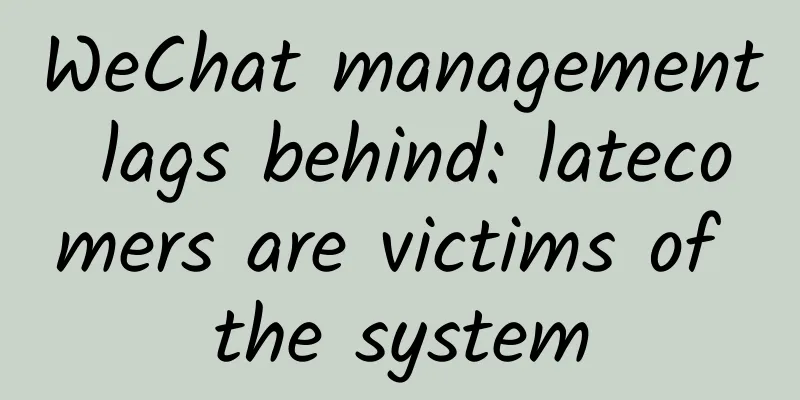WeChat management lags behind: latecomers are victims of the system

|
Yesterday, Zhang Xiaolong appeared in the WeChat Open Class and elaborated on the concept and direction of WeChat's public platform from eight aspects. He also expressed his views on some issues that users are concerned about, such as management methods. Among them, Tie Ge believes that the core is WeChat's decentralization theory. Is WeChat really decentralized or is it really capable of decentralization? According to Zhang Xiaolong's description, his understanding of decentralization is still at the level of whether there is an official entrance recommendation. This understanding of centralization is obviously still at the portal level, which is really puzzling to Tie Ge. In the portal era, the main way for users to obtain information was through the homepage recommendations of portal editors. A homepage is also a center, and content is distributed in this center. In other words, the platform officials have enough power to interfere with the transmission of information, and the homepage of portal websites has also become the focus of various public opinion analysis companies. But in the era of social media, although the official no longer directly provides the entrance to the information homepage, there is still a center when information is transmitted. On Weibo, various big accounts are the center, and the number of visits to their key accounts is often no less than that of the homepage of a medium-sized portal website. The same information can easily reach hundreds of reposts as long as it is forwarded by a big V, and even become a hot topic on Weibo. Someone who does Weibo marketing privately chatted with Tie Ge and said that it is very easy to make a Weibo topic popular. A good idea plus a big account in the relevant field, as long as the big account coordinates and reposts, it is easy to create heat. Of course, the big accounts here are not only grassroots big accounts, but also various celebrity big Vs, such as Du Haitao's Weibo. Similarly, in the WeChat world, big accounts, regardless of platform recommendations, have become information centers in the WeChat Moments. A message posted by a WeChat user with thousands of friends can get thousands of exposures and attract follow-up reposts from other fans. Of course, WeChat later realized this problem and immediately limited the number of friends in the WeChat address book to 5,000. Even so, many users can still become the center of information. Many friends have been studying social dividends, and many extreme ideas believe that social dividends are crazy forwarding to friends circle, not only to have many friends in the communication, but also to cover a precise and even high-end group of people, these people are the core of the WeChat platform. If you still have doubts, take a look at the WeChat merchants selling facial masks in WeChat Moments. They add friends crazily and then post various soft and hard promotional messages in WeChat Moments. Those who are unlucky enough to believe what is described in WeChat Moments will naturally become lambs to be slaughtered. This theory is actually very simple. WeChat merchants selling facial masks in WeChat Moments are the center of information dissemination. Although WeChat no longer officially provides an entrance, users will still gather together to form an implicit central platform. WeChat has also made long-term and unremitting efforts to decentralize, limiting the number of friends in the address book, blocking WeChat accounts that guide adding friends, blocking third-party WeChat platforms, and limiting the form of HTML5 pages... But we still see that one center falls and another center stands up again. WeChat's efforts on the road to decentralization are basically in vain, and micro-businesses are still selling masks in small centers in the circle of friends. The only thing we can do about the decentralization of WeChat is not to provide an official entrance. What else can we do? Perhaps WeChat should transfer the useless work of decentralization to other aspects. Tie Ge also does not agree with the dynamic management of WeChat. The so-called dynamic management method is basically an excuse for the lagging management. As a platform, it should have an early warning mechanism and the ability to predictably discover potential problems. However, we find that WeChat often lags behind in management. When they found that the circle of friends was flooded with information, they temporarily limited the number of friends to 5,000, no more, no less, and they didn't care how the 5,000 was obtained. Maybe they just decided the number on a whim. When they found that too many likes accumulated behavior affected the user experience, they were anxious to ban the accumulation of likes. These things are often banned long after they are launched. Some pioneers have already benefited, and later followers have become scapegoats. We may be more tolerant of WeChat and allow dynamic management methods, but can the time of dynamics be shortened? Once excessive marketing behavior is discovered, can it be discovered and stopped immediately? Not supporting a bad guy and not wrongly accusing a good guy is the basic principle of platform management. However, the long-term system improvement method has made WeChat basically a paradise for adventurers. All pioneers who dare to challenge the bottom line of WeChat have gained benefits, while those who come later have become the biggest victims of the system. This method is undoubtedly a disguised encouragement to change the way of doing evil, which is obviously not what a company that claims to be fair should do. Tiege still respects Zhang Xiaolong very much, he is indeed the collective idol of product managers. But he still boldly points out some of his problems, I believe this is also what an Internet company that claims to be open likes. As a winner of Toutiao's Qingyun Plan and Baijiahao's Bai+ Plan, the 2019 Baidu Digital Author of the Year, the Baijiahao's Most Popular Author in the Technology Field, the 2019 Sogou Technology and Culture Author, and the 2021 Baijiahao Quarterly Influential Creator, he has won many awards, including the 2013 Sohu Best Industry Media Person, the 2015 China New Media Entrepreneurship Competition Beijing Third Place, the 2015 Guangmang Experience Award, the 2015 China New Media Entrepreneurship Competition Finals Third Place, and the 2018 Baidu Dynamic Annual Powerful Celebrity. |
<<: Xiaomi banned in India: Why didn’t this happen in China?
>>: Why do programmers like to work at night?
Recommend
Baidu Live iOS SDK platform output transformation
Introduction: Baidu Live is positioned as a live ...
SumanSoul Second Sister Yoga Course Fifth Period
: : : : : : : : : : : : : : : : : : : : : : : : : ...
Surprise! The "supermoon" will be here for the Mid-Autumn Festival. This year, you can "feast your eyes"
The bright moon rises over the sea, and the world...
Cong Feicong: 18 lessons to improve your sense of security and become an intimate partner
We reject boring teaching methods and use a humor...
Why can QQ suddenly be deregistered? How much do you know about the great things that have been implemented in recent years?
Recently, the news that "QQ accounts can be ...
The public fight between Mobike and ofo, and the innovation of Zhihu Live
Long story short, today’s post is an attempt. In ...
Lock in the bull's IPOs in Hong Kong to make steady profits
Introduction to the practical course resources fo...
Geek Time_Personal Wealth Course for Programmers
Geek Time: Programmer's Personal Wealth Cours...
The traditional plum rain season has stopped, why is there no more mist and rain in the south of the Yangtze River?
For thousands of years, the plum rains have creat...
How to activate the Juliang Qianchuan platform? How to promote Juliang Qianchuan?
Douyin's Juliang Qianchuan connects Douyin st...
Learn the 4 ways to play Douyin live streaming!
During this period, I often saw people sharing ca...
In a turbulent year, ZTE suffered a loss again after its revenue exceeded 100 billion yuan
On March 23, ZTE released its full-year performan...
You have to wear a mask when you go out every day. Are you really wearing it correctly?
The weather is getting hotter. Do you always want...
Douyin operation: 4 tips to teach you how to create a Douyin hit from scratch!
Regarding "Tik Tok", many people will r...
Please, gentlemen, please stop giving your girlfriends Blue Roses, okay? !
On the brand new calendar, spring has already beg...









